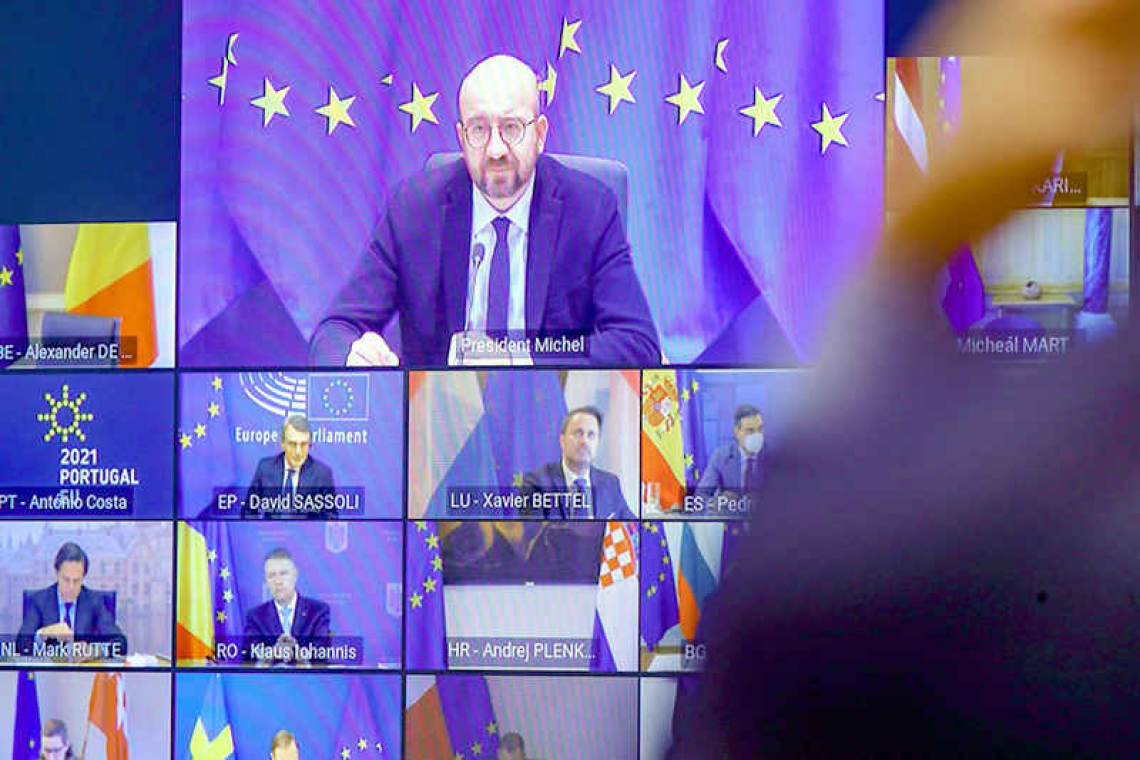European Council President Charles Michel and other EU leaders appear on screen during a video conference of European Council members on COVID-19 pandemic, in Brussels, Belgium on Thursday.
BRUSSELS--COVID-19 is here to stay, France and Germany said on Thursday, after European Union leaders discussed ways to fight new variants of the virus, step up inoculations and save Europe's tourism industry from another ruinous summer.
Leaders of the 27 EU member nations agreed in a video conference to keep "tight restrictions" on public life and free movement as the bloc races against the emergence of new variants that are holding back an economic rebound.
"We have to prepare for a situation where we have to continuously vaccinate for a longer period of time, maybe over years, due to new coronavirus variants, akin to the situation we know from the flu," said German Chancellor Angela Merkel.
French President Emmanuel Macron said the EU "will have to live with this virus" over the long term.
Italy's new prime minister, former European Central Bank chief Mario Draghi, called for a much tougher stance from the EU towards pharmaceutical companies producing the vaccines after a stuttering start to deliveries of jabs.
The executive European Commission told the leaders that 51.5 million doses of vaccines had so far been delivered across the EU and 29.17 million administered, with about 5% of citizens having had their first dose. The Commission and EU countries have come under fire for missteps in their joint inoculation programme and a slow rollout of shots that has lagged badly behind Israel, Britain and the United States.
Summit chairman Charles Michel said the bloc wanted "more predictability and transparency" from pharmaceutical companies that failed to deliver contracted vaccine volumes, putting at risk the EU's target of inoculating 70% of its adult population by the end of the summer.
Commission President Ursula von der Leyen voiced confidence that goal could be achieved. She said the firms exporting most COVID-19 vaccines from the EU were honouring supply contracts with Europe, but Brussels was keeping "a very close eye" on AstraZeneca because of its reduced deliveries.
Faced with a pandemic that has killed more than 900,000 people in Europe and thrust the continent into its deepest recession, EU leaders agreed to work on vaccine certificates, which southern countries hope will unlock tourism this summer. Merkel said technical work on so-called vaccine 'passports' should be completed by the summer but some countries - including France and Belgium - are concerned that easing travel for people who have been inoculated would discriminate against others.
Merkel said she did not currently expect to impose tighter restrictions on the French Moselle region bordering Germany as the bloc treads a fine line between restrictions to stop the spread of infections and keeping borders open to ensure the smooth flow of goods and services across the single market.
Although infection rates are heading down in about 20 EU member states, there are concerns about fresh spikes as the coronavirus variant first detected in Britain spreads rapidly. After winter lockdowns, warmer spring weather has drawn large groups of young people - last in the queue for vaccines - out into parks in European cities in recent days, many defiantly without masks.
But von der Leyen warned that the British variant was present in 26 of the EU's 27 countries, the South African variant in 14 and the Brazilian in seven. "There is growing COVID fatigue among our citizens," she said. "But we should not let up now. Not only does the situation remain serious in many parts of Europe but we must also watch for the new variants that are spreading."







